- voice
- India
- car market
- staring
- stagnancy
- selling
- foreign investors
- stock market
- decline
- issues
- structural
- geopolitical
- local
- global
- auto industry
- largest contributor
- GST
- exchequer
- local
- global
- nature.
Rough Road Ahead For the Indian Auto Industry?
- By Bhushan Mhapralkar
- March 12, 2025
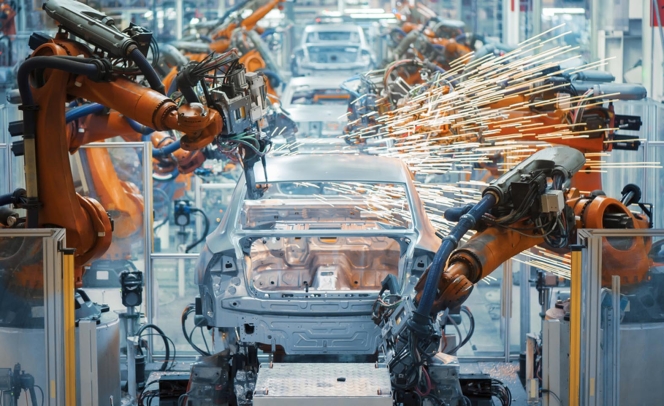
The voice about India’s car market staring at stagnancy is growing amid much selling by foreign investors in the stock market. Auto sticks of OEMs and suppliers have taken a beating lately. The reasons for stock market decline are said to be structural issues as well as geopolitical issues. In other words, they are local as well as global in their nature. The Indian auto industry – as the largest contributor of GST to the exchequer and among the highest contributor to the country's manufacturing GPD – is also quite local and global in its ways of working.
Like any other developing nation, it is a market where the scope for an increase in automobile population is bright. It is also a market that is beset by structural issues nonetheless. With 34 cars owned per 1,000 people, the country with a population estimated to be 1,463,865,525 in 2025 has ample scope for auto sales growth.
But as banks struggle for liquidity and a reduction in repo rate by the apex bank fails to reflect in the reduction of loan interest rates or equated monthly instalments, the structural issues facing the automobile industry are too stark to overlook.
Adding to the structural issues are perhaps developments such as the recent announecement by Maharashtra Government to levy six percent motor vehicle tax on premium electric vehicles. The leading industrialised state also has among the highest road toll taxes among other Indian states. The highway network in the state is among the most lacking and unsafe. Most roads in the state have either deteriorated or are under a seemingly unending period of repairs.
The state government in its 2025 budget has also announced that it has raised the motor vehicle tax by one percentage point on individual-owned non-transport four-wheeler CNG and LPG vehicles. Such vehicles currently attract a seven to nine percent tax depending on their type and price.
While electricity costs have been rising with distribution companies like MSEDCL pushing for a revision in fixed and energy charges for various categories in order to bridge revenue gap, owning electric vehicles and CNG vehicles is becoming costlier though eco-friendlier.
Attracting over 200 percent in taxes, petrol and diesel prices have been at an all-time high. A timely upward revision in toll prices is only adding further to the cost of motoring in a country where close to or more than 50 of the vehicle purchase price amounts to taxes. Spares are also taxed at a hefty 28 percent and the labour costs have steeply risen post Covid-19 pandemic.
With vehicle prices being jacked up by automakers under the pretext of rising input costs by about four to five percent if not more, the Indian auto industry is clearly under pressure to maintain its margins and stay profitable.
Against the operating costs, the foot falls in the showroom are taking longer to realise into actual sales. Discounts are gaining speed and indicative of sales losing stream in some of the segments that were until recently doing very well.
Any excitement about a rebate in Income Tax up to INR 1,200,000 – it takes over INR 1,000,000 to purchase a decent car in India today – seeming to have faded into thin air, the talk about government announced a reduction in GST taxes has gained speed. When it would actually come into effect is yet to be known but the narrative has started building. The stock market does not look excited however and the money lost by domestic investors may take a long time to come back, it seems.
As US President Donald Trump speaks about exposing India’s ‘wrong’ tariff policies in the absence of any statement from the Indian government striking out his claims, the Indian market for automobiles and other consumer goods looks destined for a rough ride. Stagnancy will be a part of the plot, the repercussions of which would stem from domestic structural issues as well as geopolitical shifts where calls like ‘China Plus One’ hold no value at all anymore.
With the entry of Tesla – which has seen its sales and stock prices plummet in many of existing markets off late – set to enter India with the government lowering tariff under pressure from the US President, the subject of too much regulation needs to be examined in terms of structural strength and the industry’s ability to be competitive. Local manufacture is also a subject that needs to be looked at as MSME sector continues to shrink and take down with it the PMI index.
Skilling is also a subject that should be looked at as engineering courses lose interest with the young in the country. A manufacturing-less economy that is also witnessing the services sector face a slowdown – again due to structural and geopolitical issues – may not spell a good omen for growth in the long run. This, particularly in the case of a country whose median age in 29 years.
China’s ‘Deep seek’ has shown how the prowess in technology can shift overnight and highly influence the economy of a nation, its stock markets suddenly. In India, the auto industry should nurture the MSME sector as much as the government should. A services alternative in terms of growth over manufacturing may not hold forth in the long-term. Manufacturing exports can shrink abruptly anytime under the shifting regulatory and other market issues in the domestic marketplace and under the shifting geopolitical situations in various parts of the world that also make lucrative export markets.
Image for representative purpose only.
Hindustan Zinc Attains 26.3% Women Workforce Representation
- By MT Bureau
- March 04, 2026
Hindustan Zinc (HZL) has recorded 26.3 percent women representation across its workforce, according to a company announcement. This figure marks the highest gender diversity level in India’s metals and mining sector.
The company employs over 745 women professionals, with 314 serving as engineers or in equivalent technical roles. Women at the company are currently involved in frontline operations, including underground mining, smelting, lead mine rescue and heavy machinery operation.
Hindustan Zinc has implemented Industry 4.0 practices, including robotics, automation and tele-remote underground operations, to standardise processes. These technologies have enabled the inclusion of women in night shifts and underground roles traditionally dominated by men.
Key workforce milestones and initiatives include:
- Frontline Roles: Women operate heavy machinery and manage night shifts in both mining and smelting units.
- Mine Rescue: The company has formed an all-women underground mine rescue team.
- Digital Infrastructure: Operations use drone-based surveillance and remote blasting systems to enhance safety.
- Workplace Policies: HZL offers a one-year childcare sabbatical, a spouse hiring policy, and work-from-home flexibility.
The company has launched a 25-day campaign titled “She Knows the Ground She Stands On” to encourage women to pursue careers in STEM and mining. As part of this initiative, 15 women from science institutions were invited to visit the company’s mining ecosystem to engage with operational teams and digital technologies.
Arun Misra, CEO, Hindustan Zinc, said, “Empowering women in mining is not merely a matter of equity, it is a strategic imperative for the future of the industry. At Hindustan Zinc, a culture has been cultivated where women lead from the front—whether operating underground mines, driving automation, or advancing sustainable metallurgy. ‘She Knows the Ground She Stands On’ reflects a commitment to challenging outdated norms and ensuring that every capable woman has the opportunity to grow and excel. As the company works toward achieving 30% diversity by 2030, the focus remains on building a workplace where inclusion fuels innovation and gender is never a barrier to excellence.”
The company aims to reach a 30 percent diversity target by 2030. The current campaign is scheduled to conclude on 8 March 2026
- BYD
- Chinese Corporate of the Year
- China-Britain Business Council
- China-Scotland Business Awards
- Chinese Burns Supper
BYD Named Corporate Of The Year At China-Scotland Business Awards
- By MT Bureau
- March 03, 2026
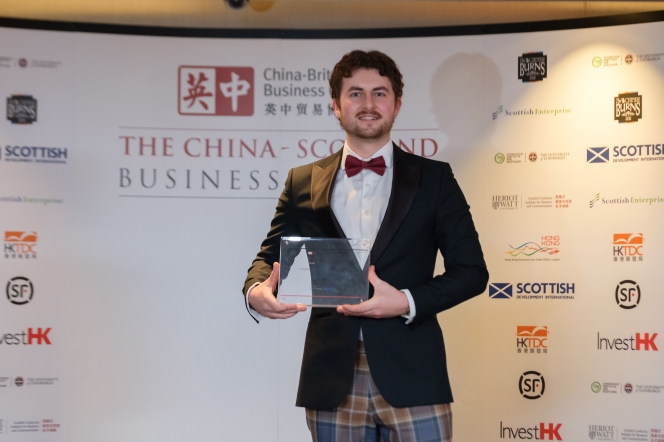
BYD has been named as Chinese Corporate of the Year at the China-Britain Business Council’s annual China-Scotland Business Awards held at a recent ceremony in Edinburgh. The accolade was presented during the CBBC’s Chinese Burns Supper, an event now in its 13th year and firmly established in the bilateral business calendar.
This particular award recognises the significant contribution of Chinese enterprises to the Scottish economy. The council specifically highlighted BYD’s substantial influence in advancing the sustainable growth of the New Energy Vehicle sector within the Scottish market, alongside the company’s impressive UK-wide sales performance, which has now surpassed 50,000 vehicles. Liam Howel, Deputy Head of Retailer Marketing for BYD UK, accepted the award on behalf of the company.
The China-Britain Business Council, serving as the UK’s premier business network for fostering trade and investment with China since 1954, acts as an independent voice for business, providing members with essential advice, analysis and access to opportunities.
Beyond the awards, the evening also served a charitable purpose, raising funds for the Migrant Children’s Foundation, an organisation dedicated to enhancing the lives and educational opportunities of underprivileged children in China through various health and learning initiatives.
Bono Ge, Country Manager, BYD UK, said, “It’s a huge privilege for BYD to have been presented with this award. Receiving this recognition is further endorsement that BYD is pushing in the right direction; we are not only producing cars which appeal to buyers and buses that keep the public transport sector moving but further forwarding the move towards sustainability via our energy storage solutions. Most of all, we are creating a business that supports local jobs both in Scotland and the rest of the UK.”
Panasonic Automotive Systems To Rebrand As Mobitera Inc.
- By MT Bureau
- March 01, 2026

Japanese tier 1 supplier Panasonic Automotive Systems Co., has announced it will change its corporate name and brand to Mobitera Inc., effective 1 April 2027. The rebranding follows a strategic partnership formed in December 2024 with the Apollo Group, aimed at strengthening software development and optimising the company's business portfolio.
The transition to Mobitera represents the company's focus on the evolution of the in-vehicle cockpit space. The new name combines ‘mobility’ with the Latin ‘iter’ (path) and the Japanese ‘terasu’ (to illuminate).
The organisation is pivoting to meet market demands by prioritising software capabilities alongside its hardware legacy. The company’s mission has been defined as creating a sustainable mobility society, supported by a vision titled ‘Joy in Motion.’
The new logo features a central ‘I’ intended to symbolise a focus on individuals. The corporate colour, ‘Mobitera Blue-Green,’ has been selected to represent the harmonisation of society and the environment.
Masashi Nagayasu, Chief Executive Officer, Panasonic Automotive Systems, said, “Mobitera reflects our vision to power the future of mobility with our high-quality technologies that elevate and enrich the human experience. As we evolve our organisation to meet the needs of today’s rapidly changing market, we are committed to staying true to the core values that have long defined who we are.”
| Before change: | After change: |
| Panasonic ITS Co., Ltd. | Mobitera ITS Inc. |
| Panasonic Automotive Systems India Pvt. Ltd. | Mobitera India Pvt. Ltd. |
| Panasonic Automotive Electronics Co., Ltd. | Mobitera Solutions Inc. |
| Panasonic System Networks Evaluation Technology Co., Ltd. | Mobitera Evaluation Technologies Inc. |
| Harima SANYO Industries Co., Ltd. | Mobitera Wel Inc. |
| Panasonic Automotive Systems America, LLC | Mobitera America, LLC |
| Panasonic Automotive Systems de Mexico S.A. de C.V. | Mobitera De Mexico, S.A de C.V. |
| Panasonic Automotive Systems Reynosa Mexico S.A. de C.V. | Mobitera Reynosa Mexico, S.A de C.V. |
| Panasonic Automotive Systems Monterrey Mexico S.A. de C.V. | Mobitera Monterrey Mexico, S.A. de C.V. |
| Panasonic Automotive Sales Company de Mexico, S.A. de C.V. | Mobitera Sales Company de Mexico, S.A. de C.V. |
| Panasonic Automotive Shared Services Company Mexico, S.A. de C.V. | Mobitera Shared Service Company Mexico, S.A. de C.V. |
| Panasonic Automotive Systems Europe GmbH | Mobitera Europe GmbH |
| Panasonic Automotive Systems Czech, s.r.o. | Mobitera Czech, s.r.o. |
| OpenSynergy GmbH | No change |
| Panasonic Automotive Systems Asia Pacific Co., Ltd. | Mobitera Asia Pacific Co., Ltd. |
| Panasonic Automotive Systems Malaysia Sdn. Bhd. | Mobitera Malaysia Sdn. Bhd. |
- IAC India
- Lumax Group
- IAC Group
- Mahindra
- VECV
- Maruti Suzuki India
- Skoda
- Volkswagen
- Stellantis
- Sunil Koparkar
IAC India Bets On Engineering Depth & Diversification, Targets 20% CAGR Growth Till FY2030
- By Nilesh Wadhwa
- February 28, 2026

Sunil Koparkar, Managing Director, IAC India, outlines the company’s strategy to reduce customer concentration, expand exports and leverage group synergies following its integration with the Lumax Group.
As India’s automotive interior market evolves towards premiumisation, localisation and faster product cycles, IAC India, part of the Lumax Group, is repositioning itself beyond a single-customer dependency model – without diluting its core partnerships.
IAC India continues to derive a significant share of its revenue from Mahindra’s passenger vehicle business. While the concentration remains high, Koparkar is clear that diversification will be driven through growth rather than dilution.
“Mahindra will always be our primary customer. We have a very strong strategic partnership. But we are also working on expanding with other OEMs and in the commercial vehicle space. Our goal remains a 20 percent CAGR,” he says.
For FY2025, IAC India USD 140 million in revenue, and is targeting a 20 percent growth in FY2026. The company counts Mahindra as its primary customer with almost 78 percent of its business coming from them, while Maruti Suzuki India (12%), Volvo Eicher Commercial Vehicles (5%), Skoda-Volkswagen (3%) and Stellantis (1%) contribute towards the remaining business.
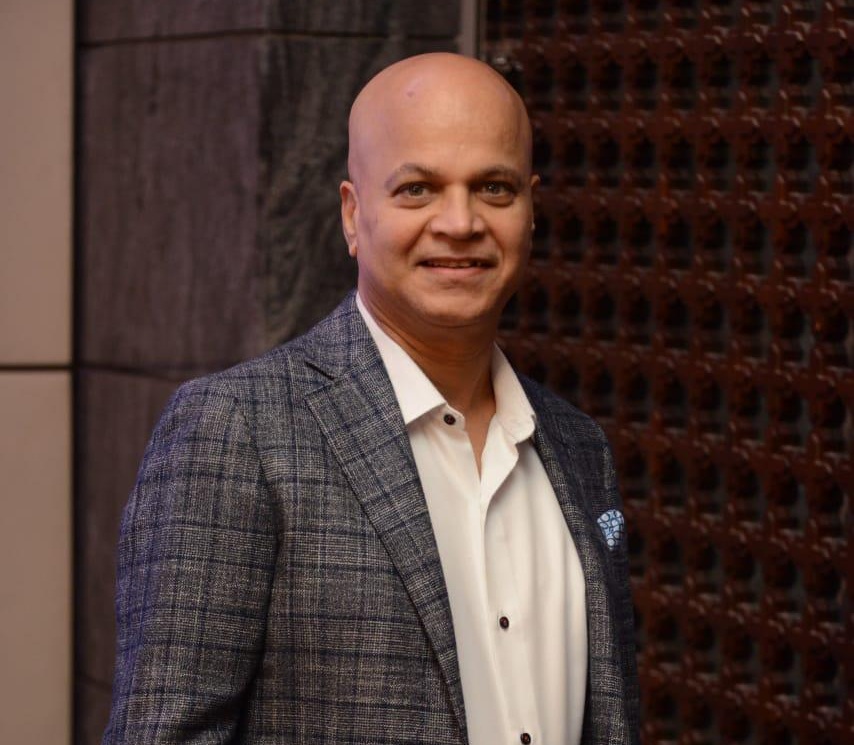 What’s more, responding to the company’s expansion plans, Koparkar revealed, that IAC Group, in addition to introducing new products, is also in talks with new-age players who have just entered Indian market (and also planning too) for supplying products.
What’s more, responding to the company’s expansion plans, Koparkar revealed, that IAC Group, in addition to introducing new products, is also in talks with new-age players who have just entered Indian market (and also planning too) for supplying products.
Currently, passenger vehicles account for roughly 90 percent of the business, with commercial vehicles forming the balance. Value-wise, Koparkar expects CV contribution to rise, even if percentage splits remain broadly similar due to the rapid growth of PV volumes.
Responding to a query on the potential growth from the CV segment, Koparkar said, “There is clear potential in CV interiors. As the CV market moves towards more comfortable cabins — with features like airbags, HVAC and infotainment — the opportunity for interior suppliers increases. Through Volvo Eicher, we have already helped drive that trend in India.”
When asked about the company’s expansion plans, Koparkar also stated that IAC Group is open to expanding to new regions as it aims to operate closer to its customers. One of the potential new projects for the company could very well be Chennai, as the company is in early talks with a new CV customer as well as VinFast.
Engineering as a Standalone Growth Lever
A key pillar of IAC India’s strategy is its expanding engineering capability. The company has been scaling up its R&D and product development team and increasingly positioning engineering services as a distinct revenue stream.
The company at present, employs over 300 engineers in India, which it aims to scale it upto 400-plus by next year and 500-plus in the coming few years.
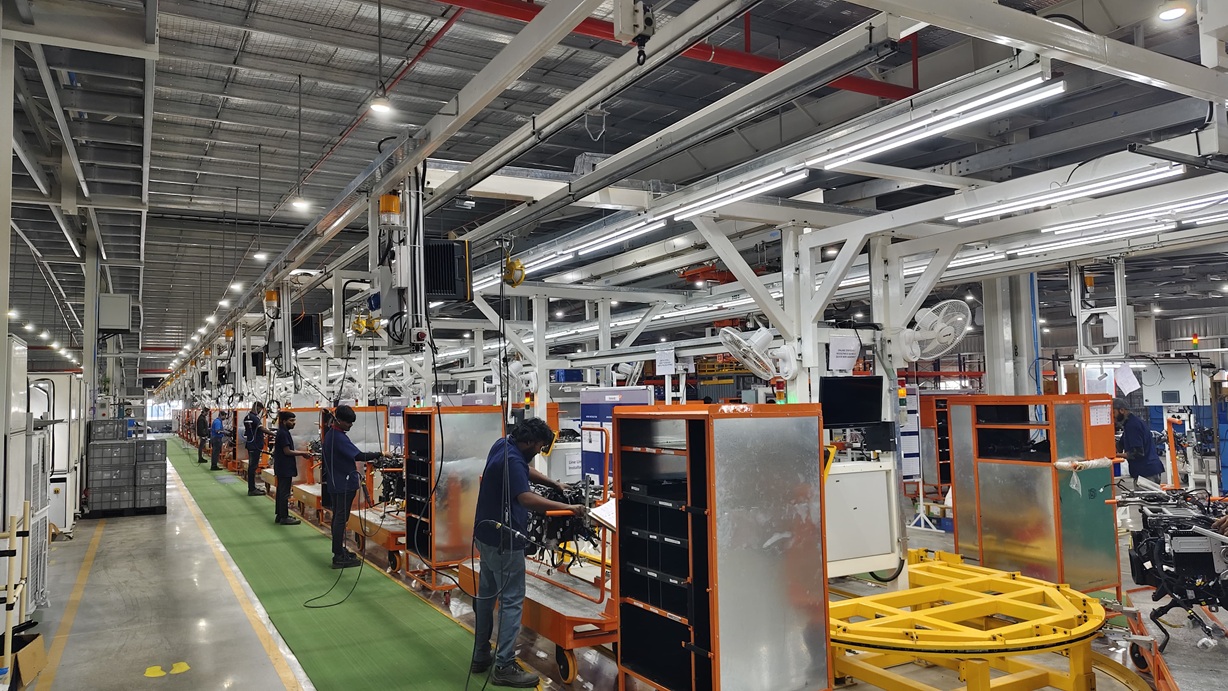
Historically, the Indian Engineering Centre supported the global IAC Group. “We were primarily the IAC Group engineering development centre. We will continue to provide those services. But now, besides global support, we are also offering engineering services to local OEMs,” Koparkar explains.
These services span studio collaboration, basic product design, CAE analysis and prototype development. In some cases, this can potentially evolve into full-scale supply programmes.
Importantly, innovation is now being formalised locally. “This year alone, we are in the process of filing about 30 patents,” he says. Earlier, intellectual property was subsumed under the global entity; now, filings are being initiated in India.
R&D investment remains aligned with group benchmarks at around 1.5–2 percent of revenue.
Exports: Measured Ambition
In terms of export potential, it currently contributes less than 5 percent towards the revenue, primarily through smaller kinematic parts. Direct exposure to the US market is negligible.
“Tariff-related uncertainty does not affect us because we do not export to the US,” Koparkar says. “Logistically, it does not make sense to ship our large interior parts there.”
Europe remains the primary export target. “The opportunity lies in leveraging our design capabilities and local development strengths. If logistics can be managed efficiently, there is room to grow.”
He also sees the Lumax Group’s aftermarket division as a future vehicle for export expansion.
Localisation and Supply Chain Resilience
On the localisation front, IAC India has made significant progress. “Last year was the first time we were able to localise over 99 percent of our tooling and development in India,” Koparkar states. Machinery on shop floors is largely localised, with only certain raw materials still imported.
The semiconductor crisis, he adds, had minimal direct impact. “We do not source electronics for our products — that is handled by the customer. However, from a development perspective, we are evaluating secondary substitutes for imported components, so we are prepared in case of disruptions.”
Premiumisation, Sustainability and AI
Premiumisation is currently the dominant interior trend. “Customers are moving away from basic plastics to more premium-feel interiors. Electronification is a big driver,” Koparkar says.
Sustainability, however, remains nascent in India. “There is no specific push for sustainable materials yet. What OEMs are looking for is lightweighting to meet upcoming CAFE norms. If a sustainable material delivers significant weight reduction, then it becomes serious.”
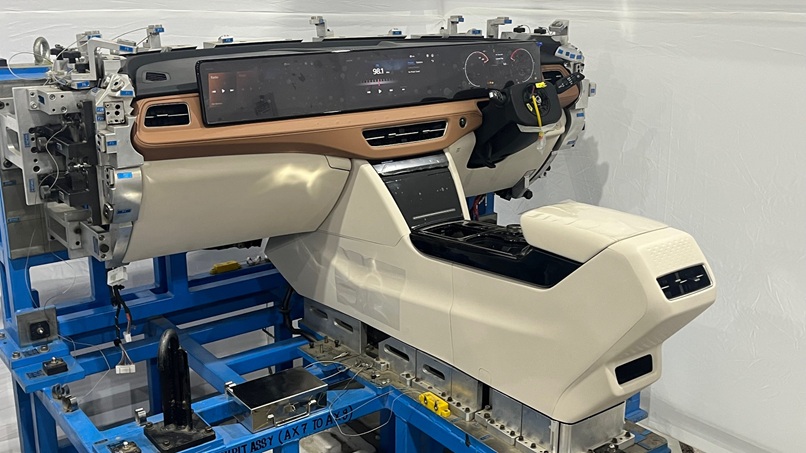
He points to jute, coir and bamboo fibres as potential alternatives but stresses that ecosystem-level collaboration is essential. “Unless a circular economy develops around us, sustainable materials will struggle to scale.”
On automation, operations across IAC’s six plants are roughly a 50:50 mix of automated and manual processes, depending on volume justification. Cobots and semi-automation are used where full automation does not offer viable returns.
AI, meanwhile, is expected to influence design more than manufacturing. “We see AI helping us accumulate design learnings and reduce design cycle times. Its impact will be more visible in engineering services than on the shop floor.”
Faster Development Cycles
Product life cycles are shrinking rapidly. “It used to take five years to develop a car,” Koparkar reflects. “With the XUV700, we worked with the customer to shrink that to 42 months. EVs are being developed even faster.”
As development timelines compress and interiors become more technology-intensive, IAC India is betting on engineering depth, localisation strength and group synergies to sustain its 20 percent growth ambition – while steadily broadening its customer and geographic footprint






Comments (0)
ADD COMMENT